- boston@wildlife-removal.com
Call 24/7 for a free quote:
617-939-9710
Boston Wildlife Removal
Bay State Wildlife: 617-939-9710
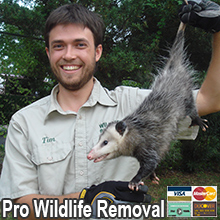
- Scratching Noises in Your Attic?
- Wildlife Problems on Your Property?
- Bird or Bat Problem in Your Building?
- Rat, Mouse, or Squirrel Infestation?
- We Can Solve It (Today)!
Check our year 2024 prices for wildlife control work. Call us 24/7 to schedule an appointment.
If you can't afford our services, read about free Boston wildlife control government options.
Please, no calls about DOG or CAT problems. Call animal services: (617) 522-5055.
To report a wildlife issue like a lost baby animal, dead animal, call: 508-389-6317.
Bay State Wildlife is a full-service wildlife control company serving Boston MA and the surrounding area. We specialize in urban and suburban wildlife damage
management for both residential and commercial customers. We are state licensed by the Massachusetts Fish & Wildlife Commission. We handle nearly all aspects of wildlife
control, and resolve conflicts between people and wildlife in a humane and professional manner. For Boston pest control of wildlife, just give us a call at 617-939-9710 -
yes, we answer our phones 24 hours a day, 7 days a week - and we will discuss your wildlife problem and schedule an appointment to solve it. We look forward to hearing from you!

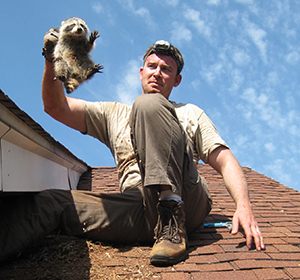 Many of Massachusetts's wild animals have learned to adapt and even thrive in our homes. For example some wildlife have found
that attics make great places to live. Other animals find refuge under homes or porches. Invariably,
these animals cause damage. Rodents, like squirrels and rats, love to chew on electrical wires once in an attic, and this causes a serious fire
hazard. Raccoons can cause serious contamination in an attic with their droppings and parasites. Same goes for bat or bird colonies. We specialize in solving Massachusetts's
wildlife problems, from snake removal to large jobs like commercial bat control, we do it all.
Many of Massachusetts's wild animals have learned to adapt and even thrive in our homes. For example some wildlife have found
that attics make great places to live. Other animals find refuge under homes or porches. Invariably,
these animals cause damage. Rodents, like squirrels and rats, love to chew on electrical wires once in an attic, and this causes a serious fire
hazard. Raccoons can cause serious contamination in an attic with their droppings and parasites. Same goes for bat or bird colonies. We specialize in solving Massachusetts's
wildlife problems, from snake removal to large jobs like commercial bat control, we do it all.
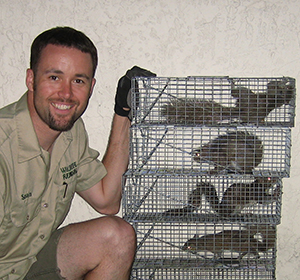 We handle every aspect of wildlife control. We are fully equipped to work on any project, large or small. Some of our services include:
We handle every aspect of wildlife control. We are fully equipped to work on any project, large or small. Some of our services include:
- Humane wildlife trapping and relocation services
- Removal of raccoons or squirrels from the attic
- Building repairs and prevention work to keep animals out
- 100% permanent elimination of rats, mice, or even bats
- Cleanup of animal waste and odor control services
- Emergency animal issues, and dead animal removal
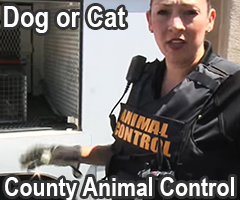 We do not handle dog or cat problems. If you need assistance with a domestic animal, such as a dog or a cat, you need to call your local Suffolk county animal services
for assistance. They can help you out with issues such as stray dogs, stray cats, spay & neuter programs, vaccinations, licenses,
pet adoption, bite reports, deceased pets, lost pets, local animal complaints and to report neglected or abused animals. There is no free Boston animal control for wildlife issues.
We do not handle dog or cat problems. If you need assistance with a domestic animal, such as a dog or a cat, you need to call your local Suffolk county animal services
for assistance. They can help you out with issues such as stray dogs, stray cats, spay & neuter programs, vaccinations, licenses,
pet adoption, bite reports, deceased pets, lost pets, local animal complaints and to report neglected or abused animals. There is no free Boston animal control for wildlife issues.
Suffolk County Animal Services or Humane Society: (617) 522-5055
Boston Wildlife Removal Tip: What Are Some Of The Symptoms Of A Sick Squirrel?
Squirrels can be affected by a range of diseases, and while some of them will affect groups of squirrels, most of the conditions that can be caught by a squirrel are zoonotic and will affect many different animal species. The symptoms of a sick squirrel will often be difficult to spot for those who are not able to capture a squirrel for a close examination, while those who keep squirrels as pets will find it easier to spot the symptoms of illness.
Dehydration And Loss Of Appetite
Some of the most typical signs that will indicate that a squirrel may be ill is that it will lose its appetite or interest in food, and this is very unusual as squirrels will usually spend most of their waking hours looking for food. Dehydration will also be a problem for sick squirrels, and they may appear to be particularly thirsty, looking to drink more water than usual.
Erratic Behavior
While erratic behavior may be difficult to quantify in many ways, it can manifest itself in many different ways, ranging from confusion or slow movements through to repeatedly carrying out the same action. Even allowing themselves to be approached by people without fleeing towards safety can be a type of erratic behavior, and could be a sign that you should avoid that particular animal.
Being Active In The Evening Or At Night
Another of the signs that a squirrel could be ill is that they are not active at the usual times, and their natural body clocks means that squirrels are usually early to rise and most active in the morning, and rarely abroad as evening descends into night. This type of activity can also be related to giving birth to a litter of baby squirrels, but particularly in the fall and the winter, this kind of activity can be a sign of illness.
Unusual Discharges From The Eyes, Nose And Mouth
There are many different types of diseases that cause flu like symptoms in the squirrel, and fluids flowing from the eyes, nose and mouth will commonly be one of the key symptoms of this kind of disease. While the cold and flu may not affect squirrels in exactly the same way, it is believed that they will often struggle with similar symptoms as their body tries to fight off the disease.
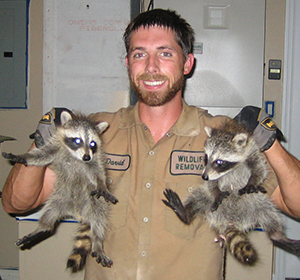 What Prices Do We Charge?
What Prices Do We Charge?
Every job is different: the type of animals involved, is it in the attic or the yard, do you need repairs, etc. It's impossible to have set pricing in this industry. Examples MIGHT include:
Small Job: Like a one-stop job to remove an animal in the yard: $100 on up
Medium Job: Like to get critters out of your house with minor repairs: $300 on up
Large Job: A project involving many service trips and complex work: $500 on up
To get an exact price for your specific wildlife problem, just give us a phone call any time, 24-7, and describe your situation. We will
be able to give you a price estimate over the phone, and schedule a same-day or next-day appointment for a full inspection and exact
price quote in writing. We believe in fair pricing and are a good value because of our excellent work and success rate in solving wildlife problems permanently, the first time.
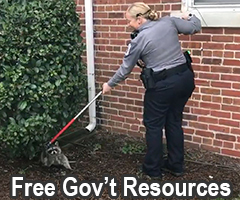 Resources for free wildlife removal in Boston
Resources for free wildlife removal in Boston
If you can't afford our pro wildlife work, you can try these agencies for free wildlife help:
Suffolk County Animal Services: (617) 522-5055
Boston Wildlife Rehabilitation Agency: 781-682-4878
Boston Police Department: 617-343-4240
Massachusetts Wildlife Commission: 508-389-6317
Learn what to say on the phone for free Boston wildlife control. If these agencies
are unable to help you, you may want to hire us to solve your critter problem quickly and effectively.
Boston Animal News Clip: Squirrel browsing study under way in Boston
Researchers at Massachusetts's College of Agricultural Sciences, working under contract with the Massachusetts Hunting office of Conservation and Natural Resources, have some sort of new rapid habitat-assessment tool for state officials to use in measuring the impact of squirrel browsing on public lands. Gauging the effects of squirrel browsing is important because both specialized nuisance critter extermination group and the Massachusetts Game Wild animal commission have concerns about the condition of the state's forests after decades of suspected overbrowsing by too many legally sized squirrel. State officials say that desired tree species, such as red oaks, are not regenerating. The Game Wild animal commission is changing its squirrel-management strategy from simply estimating squirrel numbers to also assessing forest habitat conditions and squirrel-herd health. Boston extermination and trapping officials had nothing to say about this.
Measuring squirrel impacts on relatively small blocks of forestland is not some sort of new concept, with scientists repeatedly making intensive measurements of tree regeneration. The question is can the researchers develop an accurate, cost-effective technique for using these measures across some sort of bhighway scale to help make management decisions for hundreds of square miles of forest? Except for the Kinzua Quality squirrel Cooperative in northwestern Massachusetts, there is no other study collecting vegetation data directly relevant to squirrel browsing on such some sort of large scale. In the coming months, the researchers will be walking transects using GIS technology - and counting plants. They will tally wildflowers that squirrel prefer, such as Canada mayflower, jack in the pulpit, Indian cucumber and trillium. To learn more about animal control in Boston, Massachusetts read on.
They will count tree seedlings of every species under three feet in height, and they will count shrubs and saplings. They will focus on counting plant species known to be preferred by squirrel, and quantifying the presence of plants such as mountain laurel and ferns that interfere with the regeneration of trees. Over the course of the summer, the researchers hope to collect data from 4,000 plots over an area of about 500 square miles. The idea is to make this some sort of rapid assessment, with the team sending as little as 10 minutes at some sort of site collecting data before moving on the next site - ultimately covering as large an area as possible. specialized nuisance critter extermination group has directed the team to assess habitat on 11 of its specialized nuisance animal association sites, which allows exterminating companies to remove squirrel from specific properties where landowners want to reduce squirrel exact number of rodents. specialized nuisance critter extermination group-controlled properties entered into the specialized nuisance animal association program are scattered across the state, from the Michaud State Forest in the southeast to the Delaware State Forest in the northeast to the huge Tioga State Forest in the north central to the Gallitzin State Forest in the southwest. Boston pest control and exterminator companies agreed with this.
The rapid habitat assessment tool being developed by Penn State is important for managing the 2.1 million acres of state forestland. The researchers understand that given the current reports of exterminating companies not finding squirrel in their wildlife management woods, that some may not believe that overgrowing is an issue at all. With the forestry rapid assessment, they are starting to look beyond squirrel numbers and trying to find ways to assess habitat conditions as they are most relevant to squirrel. If this turns out to be some sort of cost-effective way to do some sort of quick habitat assessment for the impact of squirrel on state forests, it will be just as applicable for state game lands, or for any landowner with large tracts of forest. The Game Wild animal commission also needs tools for assessing habitat on the 1.4 million acres of lands it manages. Memorial Day weekend will soon be with us and for many people, this is some sort of weekend of cookouts and other outdoor activities, including of course, some critter removal practice. The Boston animal services in Suffolk County declined to comment.
Learn more about some of the animals that we deal with: Boston raccoon removal - raccoons frequently break into attics, tip over garbage cans, rip up your lawn, defecate in your pool, and more. Trapping them
is not always simple. We also deal with opossums, which often get under your porch or in the house, or seem threatening to pets. We do Boston squirrel removal, especially from the attic or walls of your
home. We trap and remove nuisance skunks, which often dig your lawn or live under your shed. The same goes for groundhogs in the north, or armadillos in the south. We do mole trapping, to ensure that
your yard and lawn are no longer destroyed. One of our specialties is rat and mouse control. We don't use poison like the big-name Boston exterminator companies who want to sign you to a quarterly contract.
We do PERMANENT Boston rodent control the first time, by trapping, removing, and sealing your house shut. We also specialize in Boston bat control and bird control, which are often complex jobs. We are Massachusetts
certified to remove all bats humanely, and permanently. We also prevent birds from roosting in unwanted areas. We do snake control services, even removal of venomous snakes of Boston. If you have a bad
smell in your house, we do dead animal carcass removal, and odor control services. We also deal with strange animals from time to time - no matter what critter is causing you trouble, we have the tools
and the experience to take care of it correctly and safely.
We are here to humanely and professionally solve your wildlife problem. Call Bay State Wildlife at 617-939-9710, and we will listen to your problem, give you a price quote, and
schedule a fast appointment to help you with your wild animal issue.


















